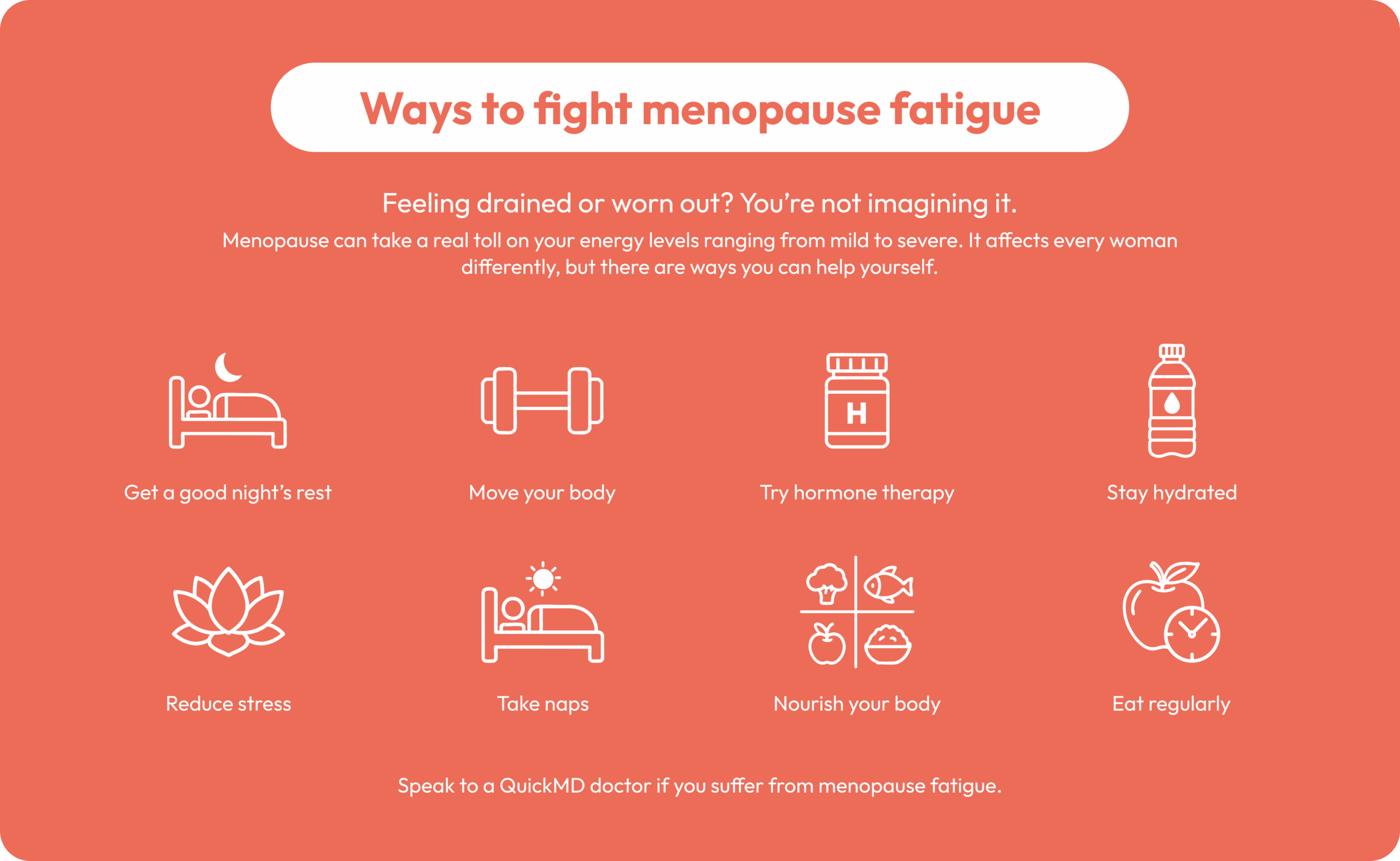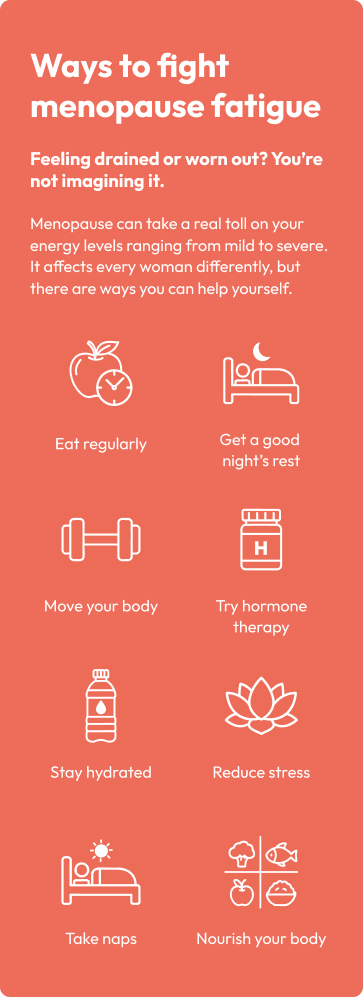Menopause fatigue: Causes, symptoms, & treatments
We’ve all had those afternoons when you suddenly hit the wall, drained and desperate for a nap. That’s the type of tired you feel after a late night, a bad night’s sleep, or when you have too much on your plate. But, if you’ve been having these days that knock you flat more often, perimenopause or menopause might be the cause.
Menopause fatigue is a very real phenomenon. The upside is that it’s temporary. Once your hormones stabilize, this exhaustion fades. However, menopause is an unpredictable hormonal rollercoaster, and it’s difficult to know exactly when you get off the ride. But you don’t have to suffer through menopausal fatigue. There are several ways to treat it and help you get your energy back. We’ll look at menopause hormone therapy (MHT), nonhormonal medications, lifestyle changes, and natural therapies so you can understand that you have options that will give you relief.
What is menopause fatigue?
Menopause fatigue is a deep, lingering tiredness that goes beyond ordinary exhaustion. It’s the kind of fatigue that doesn’t always improve with rest, and it’s often one of the first signs that your hormones are shifting.
Causes of menopause and perimenopause fatigue
Menopause fatigue often comes from changes in hormone levels that throw off your body’s natural energy balance. As hormones fluctuate, you may wake up through the night, causing exhaustion the next day. This hormonal roller coaster also affects everything from how your body regulates its temperature to how it manages stress.
Here’s how specific hormones play a role in menopause fatigue:
- Estrogen: When estrogen drops, it can trigger hot flashes and night sweats that make quality sleep seem nearly impossible. Estrogen also supports neurotransmitters like serotonin and norepinephrine, which regulate mood and the sleep-wake cycle, meaning low levels can leave you feeling irritable and sluggish.
- Progesterone: This hormone has calming and sleep-promoting effects. When levels drop, falling asleep and staying asleep become harder.
- Testosterone: This hormone supports muscle mass, energy, motivation, and libido. Lower levels during menopause can drain your stamina and leave you feeling fatigued.
- Cortisol: Your body’s main stress hormone can get thrown off balance as estrogen drops. High levels of cortisol can make it difficult to relax and rest, leading to that paradoxical “wired but tired” feeling.
- Melatonin: The hormone that tells your body it’s time for sleep decreases as you go through menopause and can worsen insomnia and disrupt your sleep patterns.
- Thyroid hormones: Your thyroid controls metabolism and energy production. Menopausal women may be at higher risk for thyroid dysfunction, which can make menopause-related fatigue worse.
Other factors can make you feel overly fatigued, too. Your provider can order lab work and perform an exam to rule out things like anxiety, sleep apnea, or iron and B12 deficiencies that might be contributing to how tired you feel.


Ways to overcome menopause fatigue
Does menopause make you tired? Yes, it can. Is there anything you can do about it? Also, yes! We’ll go through some of the solutions to menopause tiredness and fatigue, including menopause hormone therapy (MHT), nonhormonal medications, lifestyle changes, and natural therapies.
Menopause hormone therapy (MHT)
For many women, menopause hormone therapy (MHT) is a safe and effective way to ease the fatigue that comes from fluctuating hormone levels. By restoring and stabilizing estrogen and sometimes progesterone, MHT helps reduce hot flashes, night sweats, and sleep disruptions, which are the main culprits of menopause-related exhaustion. When you’re able to sleep through the night and get more consistent rest along with better temperature regulation, your energy levels start to feel back to normal.
That said, MHT might not be the right choice for everyone. It depends on your age, personal and family medical history, and where you are in your transition through menopause. Your provider can help you weigh the benefits and any potential risks to determine whether MHT is right for you.
Systemic MHT (which delivers hormones throughout your body) is the first choice for help with menopause fatigue, though local treatments can also help with related symptoms. Types of MHT include:
- Tablets: The least expensive, traditional method. They can contain estrogen alone for women without a uterus or combined with progesterone for women with a uterus.
- Patches & gels: Applied to the skin daily and absorbed into the bloodstream. This method bypasses the liver and has a significantly lower clot risk than pills.
- Vaginal creams, rings, & tablets: Local hormone therapy inserted into the vagina to target symptoms such as dryness and irritation. Effective for fatigue if this discomfort keeps you up at night.
Nonhormonal medication treatment
If hormone therapy isn’t the right fit for you, there are prescription medications that can help with menopause fatigue. Certain antidepressants can be prescribed in low doses to help regulate brain chemistry that’s been affected by declining estrogen. These medications can reduce hot flashes, boost your mood, and improve sleep quality, which can make a notable difference in your daytime energy levels.
The most common prescription options include:
- SSRIs (Selective Serotonin Reuptake Inhibitors): Paroxetine, escitalopram, or fluoxetine.
- SNRIs (Serotonin-Norepinephrine Reuptake Inhibitors): Venlafaxine or desvenlafaxine.
These medications won’t balance your hormone levels, but they can help stabilize mood and reduce sleep disruptions, making them a good alternative if you can’t take MHT or prefer not to. Possible side effects include nausea, upset stomach, headaches, weight fluctuations, and sexual side effects (such as reduced libido). Your provider will be able to help you find the right antidepressant for you. Always work with your provider on dosing and tapering to minimize any side effects.
Lifestyle changes to combat fatigue
Sometimes small daily adjustments you can make add up to a big difference in managing fatigue. These lifestyle changes support good sleep hygiene, stabilize hormones naturally, and boost overall energy. Here’s what can help:
Stick to a consistent sleep routine
Your circadian rhythm gets thrown off during menopause, but a regular bedtime and wake-up schedule can help reset it. Try to get 7 to 9 hours of sleep each night. Avoid screens an hour before bedtime, keep your bedroom cool (65-68°F), and think about trying cooling blankets or sheets.
Limit alcohol and caffeine
Alcohol and caffeine can both interfere with hormone balance and your sleep quality. Caffeine can trigger anxiety and make hot flashes worse, while alcohol prevents deep sleep and can make night sweats worse. Try limiting caffeine to mornings or switching to herbal teas for a calming evening ritual that supports relaxation.
Move your body and exercise regularly
Consistent exercise helps you manage stress and regulate hormone fluctuations. Mix up your workouts to keep things interesting and varied so you’re more likely to stick with it. Aim for 2 hours and 30 minutes of moderate aerobic exercise per week, while adding in light strength training on top of that.
Avoid foods that trigger symptoms
Spicy foods, hot beverages, and high-sugar or processed foods can trigger hot flashes, which disrupt sleep and worsen fatigue. Try tracking your meals to identify your own triggers so you can minimize them when possible.
Manage stress
Chronic stress raises cortisol and drains your energy. Habits like meditation, journaling, breathwork, or short breaks outside can help. Reducing stress helps your mind and hormones work in sync again, improving both mood and energy levels.
Natural therapies for menopause fatigue
If you’d like to try a natural approach, there are some vitamins and supplements that may help reduce hot flashes, improve energy, and help you get better sleep during menopause. Always talk with your provider before starting any supplement because it could interact with medications you’re taking or conditions you may have. Common natural remedies and supplements include:
- Magnesium: An important mineral that plays a role in mood regulation, stress response, and improving sleep quality. Supplementing your diet with magnesium can calm your nervous system and help with sleep disturbances.
- Vitamin B complex: B vitamins maintain functions of the nervous system and help produce energy from carbohydrates, fats, and proteins.
- Omega-3 fatty acids: While evidence is mixed for improving sleep and reducing hot flashes, omega-3 fatty acids show some promise for boosting aspects of physical health related to energy and stamina.
- Adaptogenic herbs (e.g., panax ginseng, ashwagandha): Adaptogens help the body manage physical and emotional stress by helping you stay balanced. Ginseng has been shown to help improve fatigue, insomnia, and depression. Ashwagandha can reduce hot flashes and help your body adapt to various types of stress.
Feeling drained or constantly tired? See how hormone therapy may help restore your energy and balance.
Fatigue is common during menopause and perimenopause, but it doesn’t have to slow you down. QuickMD doctors can help rebalance your hormones so you can feel refreshed, focused, and like yourself again.
We just launched our Menopause Hormone Therapy Membership in select states, and your first month’s on us. You’ll get to meet with a doctor, ask all your questions, and see if treatment might help.
If you love it and want to keep going, it’s $ 79/month after that, with special member pricing on medication and regular access to your doctor. And if you decide it’s not for you – that’s totally fine too. Get started by booking your free visit now.

